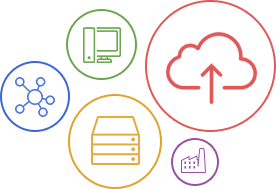
Ever wondered what servers are? Don’t worry, it’s not just a buzzword. In this digital age, servers play an important role in the storage and security of business data. Over the years, servers have evolved to become a one-stop-shop that manages, stores, and secures data 24 hours a day, 7 days a week. This means that proper server management affects a business’s daily operations and contributes to the productivity of operations. But before we delve deeper, let’s go back to basics.
First, what are servers?
A server is a computing device that provides information and functionality to other computers. It is made up of similar components that you see on your regular desktop computer - like a motherboard, processing chip, and memory, but the parts of a server are sturdier and designed to handle more complex processes. Each type of server is essentially engineered for a particular operating purpose.
Basically, servers are made to process data requests from other computers and then provide the corresponding action. The information is then sent back to the original requester or to other computers via the internet or local area network. To be able to function properly, servers must be attached to a network so that users have a way to retrieve the data stored in them.
What are the different server platforms?
For many small businesses, the plethora of technology choices to make can be overwhelming, to say the least. Here at ETech 7, our advice for every client remains the same: understand what your most important functions and operations are and then research the appropriate hardware and software that would best meet your needs. When it comes to servers, do you need physical or virtual servers?
-
Physical Servers
As the name implies, a physical server is a piece of hardware that you can see and touch. These powerful computers run operating systems and applications and can either be stored in-house or in a colocation facility. Like other types of servers, physical servers can be fully configured to meet your business’s unique needs and requirements.
-
Virtual Servers
- Virtual servers, on the other hand, are considered to be more cost and energy-efficient because they share hardware and software with other operating systems. Virtual servers are usually located offsite and allow companies to host massive servers that can be split into individual virtual environments.
Pro tip: If you want to do away from bulky physical servers, you can always check out server virtualization. Server virtualization is the process of using a large set of operating systems, processors and physical servers to act as a unified server of indefinite size and speed. The purpose of server virtualization is to mask the physical resources used, so the individual company can focus on their core function using the virtual server.
What are the different kinds of servers?
As mentioned above, one important thing to remember is that servers are used for many different reasons. Servers are usually set up in groups and, since each server is dedicated to performing one type of process, it’s uncommon to see a standalone server. More often than not, companies own groups of servers to increase the processing power available to support several databases, systems, and applications. If you’re wondering what the different kinds of servers are, then you clicked the right link! Read on to find out more.
-
Web Server
- The main function of a web server is to store, process, and deliver web pages. According to PCMag, web browsers communicate with other web servers via the TCP/IP protocol. The browser sends HTTP requests to the server, which respond with HTML pages and possibly additional programs in the form of ActiveX controls or Java applets.
-
Email Server
- Simply put, an email server or a mail server is a server that sends, receives, and manages emails using standard email protocols.
-
Application Server
- As the name implies, an application server is a server that’s designed to operate and host applications for an organization and its end users. According to CIO Wiki, an application server is frequently viewed as part of a three-tier application, consisting of a graphical user interface (GUI) server, an application (business logic) server, and a database and transaction server.
-
FTP Server
- FTP stands for File Transfer Protocol. Basically, an FTP server manages the transfer of files from one computer to another. An FTP server enables the transfer of files between computers over the internet or between computers that use different operating systems.
-
File Server
- Essentially, file servers store files for an organization’s private network and allows employees to transfer files over the network.
-
Proxy Server
- A proxy server acts as a middleman between a user and the internet. By connecting through a proxy server, businesses can encrypt the data sent over the internet to ensure its security.
-
DNS Server
- The purpose of DNS servers, according to Lifewire, is to remember a database of public IP addresses and their associated hostnames, and in most cases serves to resolve, or translate, those names to IP addresses as requested. DNS servers run special software and communicate with each other using special protocols.
-
Database Server
- A database server is used to store and manage databases and provide access to authorized users.
Why is a server important? Do you really need a server for your business?
Servers not only help businesses store data securely but also enable them to improve the efficiency and productivity of employees by providing remote access to authorized users. However, the most important function of a server is to secure an organization’s network while running applications based on user requests. If you’re wondering if you really need a server for your business, here are some other ways that a server can benefit your business:
- Servers allow authorized users in an organization to easily share resources regardless of location.
- Servers make a remote work environment possible.
- Servers increase the reliability of a business’s resources through regular data backups.
- Servers mitigate the risk of workflow disruption and data loss.
- Servers increase an organization’s computing power by deploying applications faster and more efficiently.
Another important thing to remember is to develop a server maintenance plan!
In order to ensure the health of your servers, it’s important to develop a detailed server maintenance administration plan. Some server configurations need to be monitored regularly while other configurations need weekly or monthly maintenance. At the end of the day, it depends on what you need. If you don’t want the hassle of learning how to properly establish a server maintenance plan for your business, you can always hire a team of IT professionals to develop a server maintenance plan based on your unique requirements. These IT professionals essentially become your network administrator that will take care of your day-to-day server needs.
Key Takeaway
Having your servers managed frees you from having to maintain your servers on your own. Trust us when we say that server management is time-consuming. Wouldn’t you rather focus on providing your core expertise to your customers and leave the tech stuff to the experts? Managed service providers reduce company downtime, guarantee server security and data backup, and can be personalized to fit your company’s needs.













